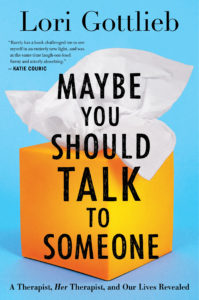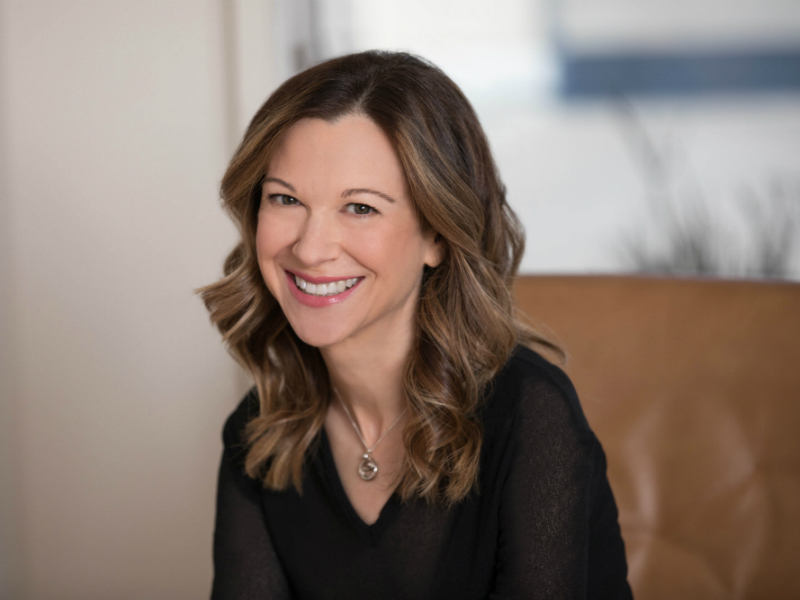Lori Gottlieb, a Los Angeles-based psychotherapist and advice columnist, is living any author’s dream. Her latest book, Maybe You Should Talk to Someone: A Therapist, Her Therapist and Our Lives Revealed, just hit bookstores last month and has already jumped onto the New York Times bestseller list.
Not only that, but this part memoir, part case study is being developed as a television series starring Eva Longoria.
The book follows five patients: a self-absorbed Hollywood producer, a young newlywed diagnosed with a terminal illness, a senior citizen threatening to end her life on her birthday, a 20-something who can’t stop hooking up with the wrong guys and Gottlieb herself, who, as her own world comes crashing down, realizes she needs a therapist of her own.

Maybe You Should Talk To Someone is inspiring, tender and funny, with chapter titles such as: “If the Queen Had Balls,” “My Neshama,” “Therapy with a Condom On” and “My Wandering Uterus.” Gottlieb explores love and loss, gender and culture, parents and children, regret and redemption, and hope and change – giving the reader a behind-the-scenes look at the life of a therapist.
“I really wanted to demystify what therapy is by bringing people into the therapy room so that they could see the trajectory of these people’s stories – including my own – but also to see the heroic moments,” said Gottlieb.
“I want them to be able to use it as a model for doing something different in their own lives. Essentially, we are grappling with what the eminent psychiatrist Irvin Yalom calls our ultimate concerns – death, isolation, freedom and meaninglessness. At first glance, you may not look like any of these patients in the book, but you’ll recognize aspects of yourself in all of them.”
READ: HOWARD CHERTKOW: RESEARCHING DEMENTIA
One of the main themes of the book is that we are more the same than we are different, and we grow in connection with others. And in our fast-paced, technology-driven, screen-obsessed culture, this can all too easily get lost.
“My son just had his bar mitzvah and he is learning about valuing other people and having compassion. I think that these ideas, in terms of compassion and how we look at bridging the gap between differences with other people, is a Jewish value that I grew up in,” Gottlieb said.
Gottlieb’s career trajectory is a story in and of its own. “I started out in film and then later network television. When I got to NBC, I was a junior executive and the first shows they were premiering that year were Friends and ER,” she said. “I worked with a consultant who was an emergency room physician; he was there to make sure that all of the trauma-based scenes were choreographed correctly and to help come up with ideas. I loved the rich fictional stories that we were telling on the show, but I loved the real-life stories even more.”
So she left television, went to medical school and then, after a stint as a journalist, Gottlieb got a graduate degree in clinical psychology. “I went from telling people’s stories as a journalist to changing people’s stories as a therapist,” she said.
One of the greatest lessons Gottlieb learned as a therapist is that there’s no hierarchy of pain. “We all suffer – it’s a part of the human condition – but many of us suffer in silence. We’re isolated in our pain because we don’t feel like it rates high enough to be worthy of attention,” she explained. “It’s very different with physical pain. If something is off with your body, you will probably get it checked out. But if someone is feeling some kind of emotional pain, they usually won’t get it checked out until they have the equivalent of an emotional heart attack.”
In the book, Gottlieb’s therapist points out that we talk to ourselves more than any other person over the course of our lives, but our words aren’t always true or respectful. Too often, we are critical of ourselves. “In therapy, we learn to pay close attention to those voices in our heads,” said Gottlieb. “When we become kind to ourselves, we become kinder to other people.”
